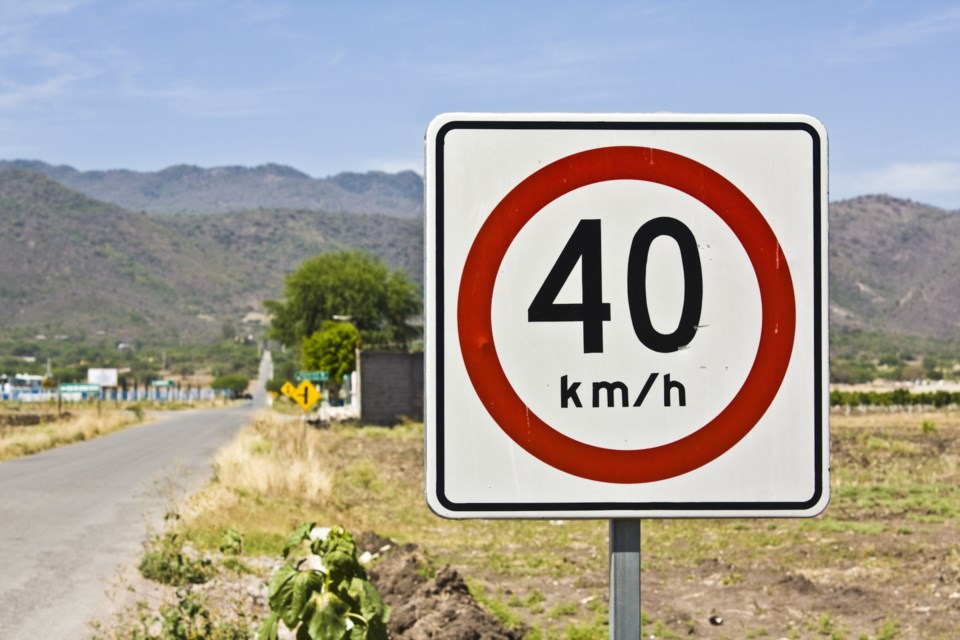The speed limit saga continues at the Collingwood council table with a 5-4 vote last night that will push the issue to 2022 budget discussions.
Though the deputy mayor indicated the night could be a “watershed moment,” it was more like a dripping faucet as council decided – by a slim majority – to get estimates for a comprehensive review on speed reductions in town.
“Given the option to proceed to 40km/h tonight, I would do so,” said Keith Hull, one of four dissenting votes against the motion to cost out a report. “We’re elected to make decisions and I think this is one of those watershed decisions.”
Five of nine council members voted for a slower approach to speed reduction, one supported by town staff.
“I want a comprehensive report that is Collingwood specific,” said Coun. Mariane McLeod. “I’m going to be making my decision based on facts, not perceptions or feelings.”
She said council already voted to install traffic calming speed cushions in school zones where the speed is set at 40 km/h.
“If we voted to put in extra measures, we are admitting to 40 km/h maybe not being safe. Maybe it's 30 km/h we need to go to, I don’t know,” she said. “And I would like to find out.”
On the other side of the argument, Coun. Tina Comi pointed out that council’s adoption of a traffic calming policy suggests the town has prioritized slowing residential traffic to make it safer.
In her original proposal to reduce the speed of local and collector roads in Collingwood from 50 km/h to 40 km/h Councillor Yvonne Hamlin wanted to see the changes by ski season.
Hamlin cited town and provincial studies indicating speed is a factor in fatalities and severe injuries in pedestrian-vehicle collisions. And studies show reduced speeds increase the chances of survival.
“I think we’ve studied this, and I think we’re ready,” she said. “I think what’s going to happen over time as all the communities move to 40 km/h, is that’s what’s going to be expected. It’s going to be the common thing to do.”
There are other Ontario municipalities that have already made the switch to 40 km/h speeds, including Orangeville, Guelph, and North Greenville (for Kemptville)
Mayor Brian Saunderson said he didn’t want to make a decision based on information gathered for decisions made by Guelph and Orangeville municipal councils.
“Every community is different, we need to know where we need these controls,” said Saunderson. “Making it a 40 km/h zone doesn’t necessarily make it the safest zone.”
Coun. Kathy Jeffery and Coun. Bob Madigan said they heard from constituents who were against a speed reduction on town roads.
“I committed to representing everybody and I would like to hear from everybody before I make a decision,” said Jeffery.
Based on an earlier suggestion from Coun. Deb Doherty, councillors also asked staff to start a public engagement campaign to find out what residents think of reduced speeds on local and collector roads.
After last night’s vote, any change has been postponed to an unknown future date. Instead, the 2022 budget deliberations will require council to sign off on a chunk of cash to pay a consultant to look into speed reductions in town, their effectiveness, and the places where reductions are (if at all) most needed.
Mayor Saunderson along with Councillors Madigan, McLeod, Jeffery, and Berman voted in favour. Hamlin, Hull, Comi and Doherty were opposed.
“People who reach out to me concerned about safety and speeds, they want something done today, not tomorrow,” said Hull. “The supporting evidence is there, if we hire the right consultant, they’re going to use the evidence that is already there. They’re going to come back with the recommendations we have today.”
Speed limit discussions will return to council agendas in the fall.



